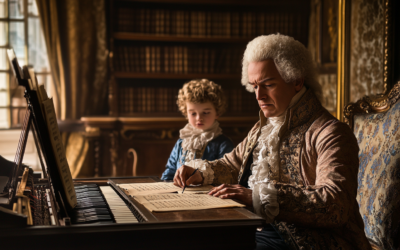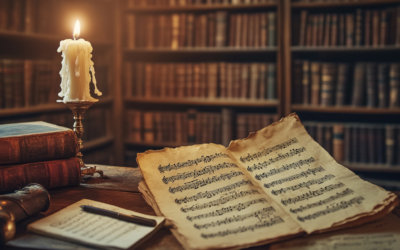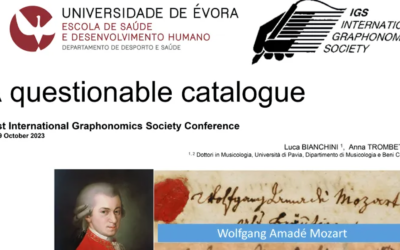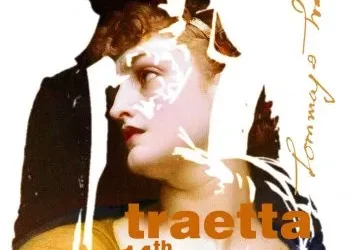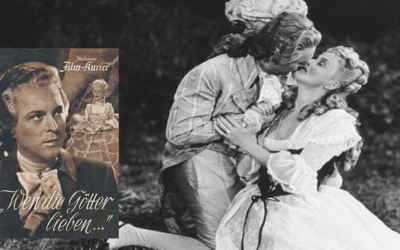New Revelations About Mozart
at the Évora Forensic Conference
At the Évora Forensic Conference, new research confirmed that both Mozart’s personal catalogue and the signatures on his violin concertos are forgeries, challenging long-held beliefs.
Mozart: The Fall of the Gods
This book offers a fresh and critical look at the life of Wolfgang Amadeus Mozart, challenging the myths that have surrounded him for centuries. We strip away the romanticised image of the “natural genius” and delve into the contradictions within Mozart’s extensive biographies. Backed by nearly 2,000 meticulously sourced citations, this work invites readers to explore a deeper, more complex understanding of Mozart. Perfect for those who wish to question the traditional narrative, this biography is a must-read for serious music lovers and historians.
"The bass clefs and signatures once thought to be Mozart’s have now been revealed as forgeries, rewriting 250 years of music history."
@MozartrazoM
Exciting Mozart-related discoveries were unveiled at the International Conference on Forensic Handwriting and Document Examination held in Évora, Portugal. In the photo, we are at the University of Évora alongside Dr. Anthony Jarvis from Darwin University in Australia and Professor Heidi Harralson, a Board Certified Forensic Document Examiner from East State Tennessee University, a renowned author in forensic document analysis for court experts.
All four of us focused on Wolfgang Amadé Mozart during our time in Évora. Besides our scientific paper on Mozart’s personal catalogue, two other groundbreaking papers were presented. The first, by Anthony Jarvis, examined the bass clefs in Mozart’s personal catalogue. Through statistical and geometric analysis, Jarvis proved that the bass clefs in the catalogue are incompatible with Mozart’s handwriting, further supporting our claim that the catalogue was not written by Mozart but is a forgery.
The second paper, presented by Professors Heidi Harralson and Martin Jarvis, scrutinised the so-called autograph signatures on the manuscripts of Mozart’s violin concertos. Their research revealed that these signatures, believed to be authentic for 250 years, are also forged.
You May Also Like
K.143: A Recitative and Aria in the Shadows of Doubt
K.143 is a prime example of how Mozart scholarship has turned uncertainty into myth. With no definitive evidence of authorship, date, or purpose, this uninspired recitative and aria in G major likely originated elsewhere. Is it time to admit this is not Mozart’s work at all?
The Enigma of Mozart’s Symphony K.73
The Symphony in C Major K.73 has long puzzled Mozart scholars. Touted as a youthful work of prodigious talent, its origins are murky at best. The title “Symphony,” inscribed on the first page of the autograph, is devoid of the composer’s name, casting immediate doubt on its attribution to Wolfgang Amadeus Mozart. Was this truly his work, or is the Symphony yet another victim of overzealous attribution?
Mozart’s Thematic Catalogue Exposed as a Forgery
A groundbreaking forensic analysis reveals that Mozart’s thematic catalogue, long thought to be his own work, is a posthumous forgery. This discovery, detailed in Mozart: The Construction of a Genius, turns centuries of Mozart scholarship on its head, demanding a re-examination of his legacy.
Bologna Connections
Quirino Gasparini’s rediscovered Mitridate aria takes centre stage in Bern and Basel, shedding light on Mozart’s reliance on this forgotten composer.
International Traetta Award
We are thrilled to announce that the 14th International Traetta Award has been bestowed upon Anna Trombetta and Luca Bianchini. This prestigious recognition honours their outstanding dedication to musicological research on primary sources of the European musical repertoire, offering significant contributions to reshaping the historiography of 18th-century music.
A Legacy Rewritten by the Shadows of History
Mozart’s image, often regarded as a universal symbol of musical genius, was heavily manipulated by the Nazi regime, a fact largely ignored in post-war efforts to “denazify” German culture. From propaganda-driven films to anti-Semitic narratives, Mozart’s legacy is far more complex and troubling than we are often led to believe.


